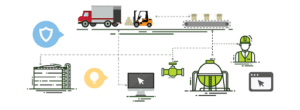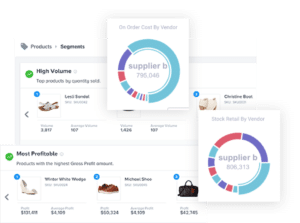For online retailers, inventory management is critical. Implementing the right inventory management software increases efficiency, reliability, and—most importantly—scalability.
But choosing the right system for your business can be tricky.
It’s important to invest in software systems that meet both your current and future needs. And we’re here to help you make the right investment.
If you’re looking for a centralized system to manage all of your inventory control operations there are a couple of options that you can choose from.
Many businesses choose to invest in an all-in-one ERP inventory system to cover all bases from warehousing to replenishment and purchase orders to managing distributors. But, there are other more efficient, flexible, and cost-effective options out there for online retailers and wholesalers.
Omnichannel retail operating systems like Brightpearl offer all the core functionalities of an ERP inventory system that retailers need—like order management, inventory management, point of sale (POS), CRM, and more—while remaining more flexible and cost-effective.
Specialized tools like these are tailored to meet the needs of growing omnichannel online retailers. Instead of using a one-size-fits-all approach, you’ll be able to streamline all of your retail-specific processes across multiple channels—all under one roof.
So what’s it to be?
If you’re still not sure which type of system is right for you, don’t fret. We’re going to cover everything you need to know about inventory and retail management systems so that you can make the best decision for your business.
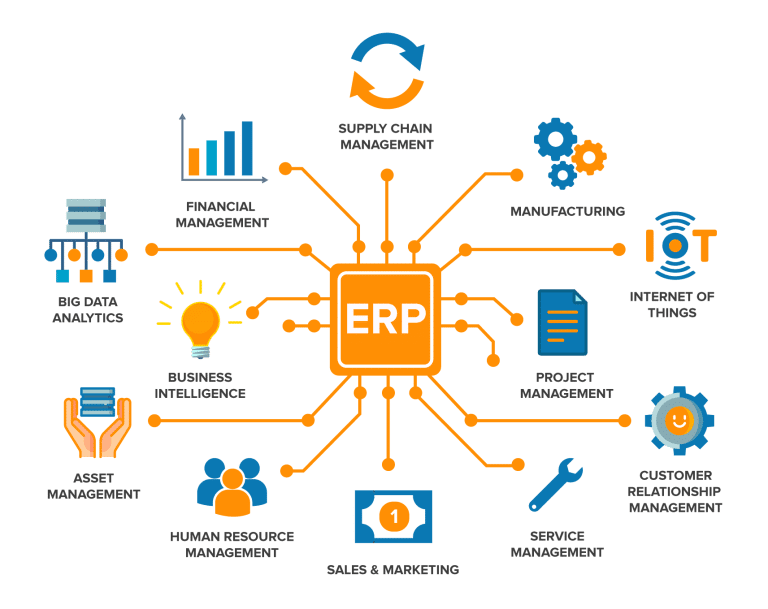
Image: Robotics and Automation News
We’ll be covering:
- What is ERP inventory management?
- Typical features of an ERP inventory management system
- Do you need an ERP to manage your inventory?
- Benefits of a retail tailored operating system vs. ERP inventory management system
What is ERP inventory management?
ERP is short for Enterprise Resource Planning. ERP inventory management is an integrated approach to business operations.
ERP inventory management systems help businesses manage each of their business operations from a single platform. Typically that includes the management of inventory, finance, operations, planning, and logistics.
ERP systems use real-time data to help businesses handle complex inventory processes across an entire organization. Whilst all ERP modules exist under the same platform, each different function works as an independent piece of software in its own right. The benefit of this is that data can be shared across modules to help make more accurate calculations quickly and easily.
The long and short of it is this. Small businesses might get away with using one or two isolated software tools. But for many larger organizations, this starts to become an organizational nightmare.
Instead of investing in multiple separate software tools to manage your inventory, businesses can invest in one single platform. And for many medium-to-large sized businesses, this extra level of efficiency and synchronicity is priceless.
Image: Unsplash
Typical features of an ERP inventory management system
ERP system features are designed to streamline business operations. One of the fundamental functions of an ERP inventory management system is to assist with order quantity calculations.
This helps businesses plan and replenish their orders in a timely and economical manner, avoiding stock-outs and other costly consequences of inaccurate inventory control. An ERP will help you view, calculate, and automate your stock levels, real-time inventory, and reorder points. For example, inventory items can be automatically ordered when data shows that demand for a particular SKU has reached a certain predetermined level.
Likewise, an ERP system might be used to make sales orders automatically when procurement prices are low or to identify and troubleshoot issues with a surplus. Each ERP inventory management system will offer slightly different features. But most will cover the following:
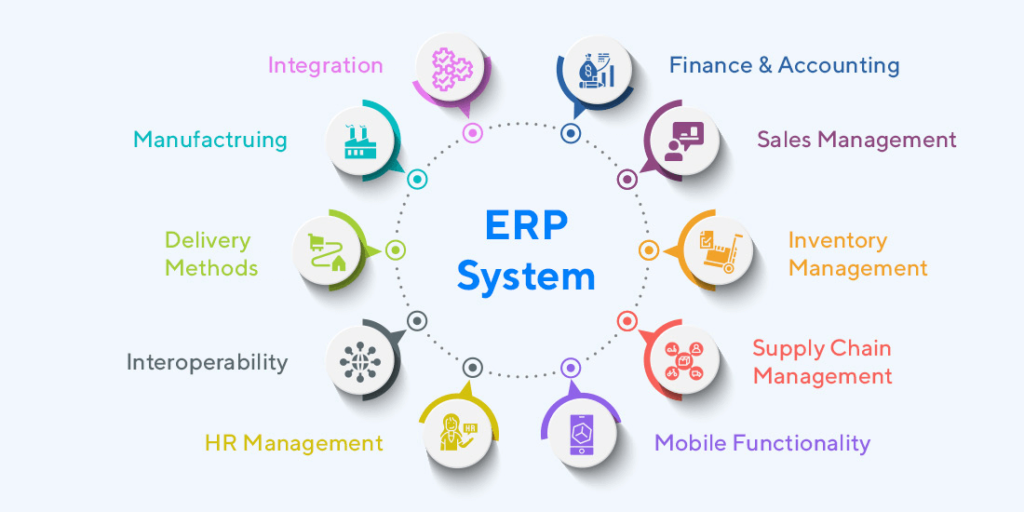
Image: MoonInvoice
Automation
ERPs automate repetitive and time-consuming business tasks, like data entry, to save time and reduce error. This works because data entered into an ERP system by users becomes available across the entire organization. And that data fuels highly efficient, intelligent, automated processes. When automation works at its best, it means lots of time and money saved. However, it’s highly likely you need a system admin to code and develop automation rules in an ERP system.
One single system
One of the primary roles of an ERP is to integrate processes across departments and eradicate those unhelpful data silos. ERPs collect data from across a business to collate an overarching view of operational, financial, business, and customer data. This business intelligence fuels accurate reporting, insights, and better business decision-making.
Data management & reporting
ERP systems mobilize data to aid better decision-making by providing actionable insights. Highly accurate real-time reporting allows for operational optimization, financial savings, and better services all around. An ERP will compile data into visual reports, charts, and graphs.
Supply chain management (SCM)
A core function of ERP systems is supply chain management. That includes demand and inventory tracking, manufacturing processes, logistics, and distribution management. ERPs collect supply chain data to suggest optimized purchase and transfer orders.
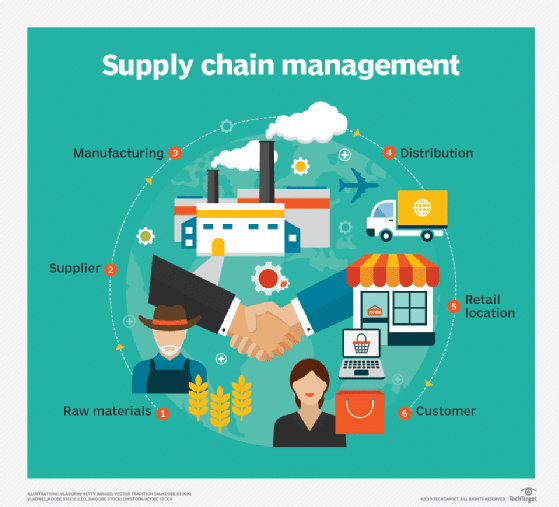
Image: TechTarget
Accounting & financial management
An ERP will offer financial data tracking and analysis for all business accounts, budgets, and forecasting requirements—much like standard accounting software. Some systems may also offer additional features such as tax and asset management, revenue recognition, and multi-currency recognition.
An ERP is designed to help businesses organize and optimize their financial planning, spending, and decision-making.
Customer relationship management (CRM)
Many ERP systems integrate with CRMs to incorporate customer data into reporting and decision-making. ERPs will mobilize data such as contact information, prospect status, serial numbers, and order histories to create an accessible database from which prospects can be reached.
This then helps marketing and sales teams to target high-converting leads, optimize lead times, and create better campaigns.
Manufacturing management
ERP systems help businesses make their manufacturing processing more efficient with product planning, raw material sourcing, and production monitoring.
An ERP will collate and store precision data regarding your bill of materials, shop-floor controls, distribution planning, product tracking, and more, in order to help manage your inventory planning operations.
Other possible features include:
- Warehouse management systems (WMS)
- Stock transfers/tracking (both on-premises and involving external fulfillment centers)
- HR & Payroll
- Procurement
- Payment gateways
- Barcoding and scanning
Image: Jill Insights
Do you need an ERP to manage your inventory?
So, do you need an ERP?
That’s a great question. Deciding whether an ERP is right for your business depends solely on what core features you need in order to manage your inventory levels effectively. Like with all software tools, ERPs have their pluses and minuses.
ERP systems are great for achieving supply chain transparency, inventory optimization, data-led reporting, more accurate counts, and quality checks.
However, ERP systems can come with highly complex implementations which end up only further complicating your business functions. As such, some businesses will find it challenging to implement an ERP company-wide.
Because ERP systems work on the basis of a one-size-fits-all, 360-degree approach, they are more complicated than either stand-alone inventory management systems or retail-specific operating systems. ERP tools also often lack some of the more specialized features your e-commerce business needs and usually don’t offer pre-built integrations with e-commerce platforms and marketplaces.
On top of this, due to the added complexity of implementation and management of the ERP itself, some businesses find that they end up having to hire a specialist ERP consultant just to customize and maintain the system effectively—and that comes with added expense and inflexible system evolution .
Many companies will end up growing out of their ERPs at some point due to their lack of flexibility. That may lead them to have to add complex customizations (potentially from third-party providers) to help their system keep up.
But this can be avoided. For businesses in need of highly scalable software with straightforward implementation, superb flexibility, and configuration rather than customization, retail tailored operating systems such as Brightpearl offer the core functionality of a great ERP, without the added headaches.
Let’s take a look at some of the benefits.
Benefits of a retail tailored operating system vs. ERP inventory management system
When it comes to inventory management, retail businesses have two main options. An all-in-one ERP or dedicated omnichannel retail operating systems like Brightpearl.
The former is essentially back office software that does everything. ERPs offer a fixed full-stack that can work for all the industries.
However, ERP inventory management systems are not specialized retail tools.
Retail operating system is, by nature, retail-oriented.
Systems like Brightpearl offer comprehensive retail-tailored functionality for omnichannel merchants to manage their post-purchase operations, and are more flexible than ERP systems when extending your tech stack.
You may find that an ERP lacks certain retail-oriented features and offers other features that simply aren’t relevant to you. So choosing a retail tailored operating system over an ERP means that you can rest assured your software has all the features that your business actually needs, without paying for all the functionality you don’t need.
Tailored retail operating systems, on the other hand, are configurable rather than customizable. That means major integrations are already built and you can easily plug in other integrations via API without building and customizing any necessary integrations. This also makes the implementation process much easier and shorter.
Other benefits include:
1. Pre-built e-commerce integrations
Retail-tailored operating systems such as Brightpearl offer a selection of pre-built, high-performance e-commerce integrations and connectors to third-party apps and services. Featured e-commerce and marketplace integrations include Shopify, Shopify Plus, BigCommerce, Magent, Amazon and eBay. Other customized sales channel integrations can be quickly built through our thriving partner network.
Brightpearl uses an open API to provide complete flexibility and integrations with any workflow, process, or key applications.
2. Cost-efficiency
ERPs are very robust tools. An ERP is designed to work for all industries. And whilst that seems convenient, it’s also not particularly cost-effective.
When you purchase ERP software you’re paying for all the functionalities you don’t need, as well as the ones you do. Plus, as we’ve mentioned, there may be some more specialized retail functions that aren’t included in the pricing plan. Customizations are likely to come at extra expense.
By contrast, tailored operating systems are set up and customized for the particular needs of your business. That means you’ll only pay for the functionalities you actually need. You’ll save money in up-front costs and long-term maintenance by avoiding errors or costly alterations.
3. Faster implementation
ERP implementation can be complicated and the failure rate can go up to 75% Retail tailored operating systems not only make business processes as efficient as possible, but can also be implemented more efficiently.
Brightpearl, for example, has an implementation period of 90 days on average. And the whole implementation project is scoped before the contract is signed, which ensures an implementation success rate of 97%.
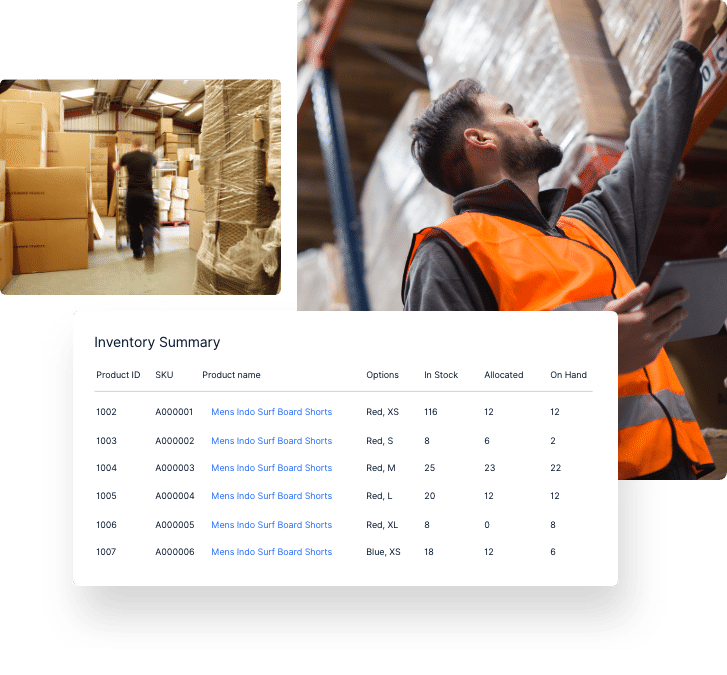
4. Flexibility and scalability
A retail-tailored operating system like Brightpearl is extremely flexible. Tailored operating systems like Brightpearl can be easily integrated into your pre-existing retail tech stack without any customizations needed.
However, an ERP will require complex coding and process re-engineering. Especially if you need to adjust to a new business model.
For example, if a wholesaler wishes to adopt a direct-to-consumer (DTC) model, it will be much simpler to do so using a retail-tailored operating system than it would with an ERP inventory management system. Furthermore, if your company is scaling to cover multiple market sectors, a one-size-fits-all ERP might struggle to adapt.
5. No coding effort required
Brightpearl has a rule-based automation engine that can automate critical operations from inventory management to order processing and shipping. But to do the same thing with an ERP, you’d need dedicated IT resources to build the equivalent customized automation workflows. Something that needs significant expertise in coding and related fields.
To ERP or not to ERP?
There is no right or wrong answer when it comes to choosing a software solution. It all depends on your own unique business needs. What are your priorities and which software option is going to help you achieve those key goals with efficiency and flexibility?
ERP inventory management systems are incredibly useful, but only if they offer everything you need to grow and scale. Remember, these are one-size-fits-all solutions that aim to cater to every industry. As such, an ERP will often lack the specialized features and functions that your particular industry requires. On top of this, ERP users often find that some features go to waste.
To meet your industry-specific needs, a retail tailored operating system offers a far more flexible approach to business management, with features and integrations tailored to individual business needs. For growing online retailers—particularly those operating across multiple channels—a designated retail platform offers the full package.
A retail-tailored operating system like Brightpearl, offers a great deal more operational agility and flexibility, whilst still providing all the core features and functions that you’ve been looking for in an ERP.


